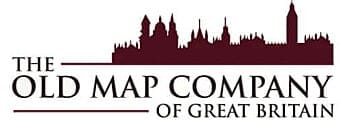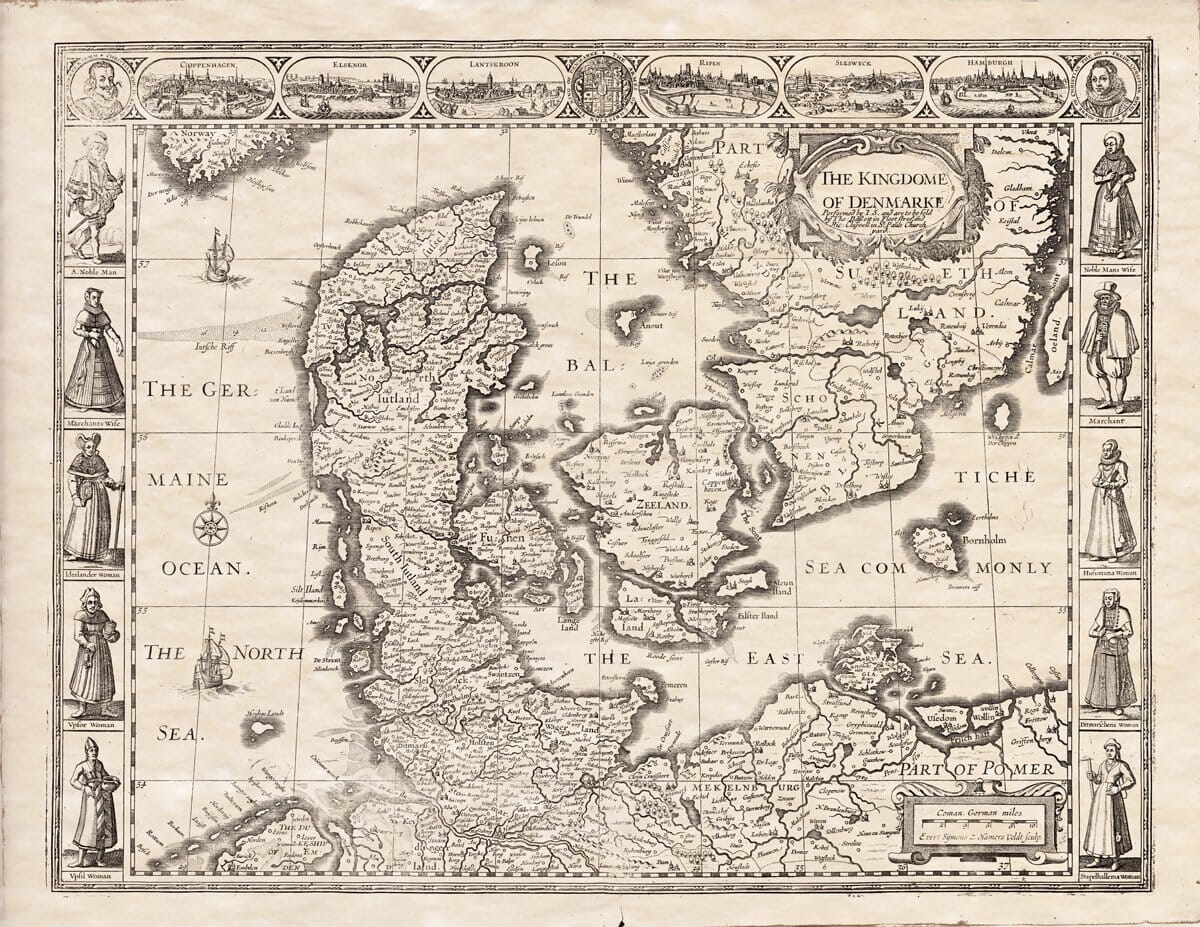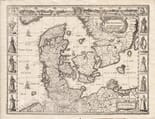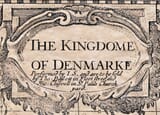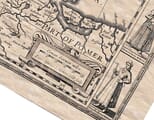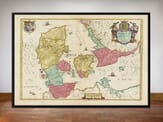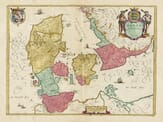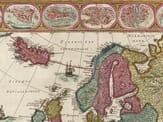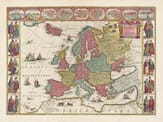Description
John Speed added historical notes on the rear of his maps (the verso) here’s his take on Denmark which we’ve transcribed attempting to replace old spelling of place names and changing old words to more modern English.
THE DESCRIPTION OF THE KINGDOM OF DENMARK
The Kingdom of Denmark strikes into the Sea, upon the North of Germany, as Italy on the South: the manner of both is not much unlike and the glory of this heretofore was not inferior. For however in the later ages the pride of Rome hath pranked up her Territories in gay apparel; yet the day was when both she and they stooped to the Inhabitants of this Country, though then known by another name of Cimbria Chersonesus. Three Roman Consuls, Manlius, Silanus, and Cepio, fell by their Sword; and the Empire it self (it seems) was in a shrewd hazard, when from Historians it reports, Adem quae de imperio, nisi illi fuis Germanis constitisset.
(2) The people were strong, and had been from their beginning the Cimbri, of German growth, first Son of Japhet; who before they removed into this quarter of the World, dwelt in the inner Asia, near the frigid zone which put them from the Pontus Euxinus to the Palus Maeotis: there we yet find the Bosphorus Cimmerius in Pontus, which took name from the Cimmerii: so for they were called at large, and by contraction Cimbri.
(3) From thence they were in time disturbed by the Scythians, and forced to seek them a new Seat for their habitation, which (after long travel) here they found, fitter for security; as being a Peninsula fenced almost round with Seas from the force of all foreign enemies: yet here too they met at last with a worse danger, that could be relieved. For the main Ocean brake into a great part of the Country, displaced many of their Colonies, and rent them asunder from the Continent, leaving for a dwelling within her Dominions: but their own treachery being too long neglected ended in a mischief which to this time had lain (as it were) close in a decided Nation, and now they brake out into flames, which stirred them to require that by force of Arms, which they could not request by divine protection.
(4) Hence grew their first quarrel with the Romans, which they put on with that courage and success, that they were emboldened at last to assault the very City with huge Forces, that the glory of it began to shake, and threatened no less ruin, than the valour of the whole Roman Legions: and that (as some relate) was bought of his tenth deals by so dear a rate, by the bloody sacrifice of his own Daughter. The great and most memorable Encounter was six hundred and forty years after the building of Rome, about an hundred and eleven before Christ. And then indeed they received (in a manner) a fatal rebuke, which endured for the present: not so, but that in after ages they recovered strength and fame, passed their victories over the most part of Europe, and left their name (for many years since that) in Italy it self.
(5) For without doubt those Cimmerii mentioned by Strabo, which lived on the North-side of the Appennine Mountains near Bisanum, were of this stock, and of that note, as they gave occasion for many Proverbs and Fables to both Greek and Latin Poets. It was a people which belike fled from Sun, but lurked for the most part under ground, lived upon theft, and issued forth only in the night, so that no man of it feared darkness: and so was their whole course, which caused our well known Adage of cimmerian darkness. Their horrid Dens, and dismal Rivers, which ran by the place of their abode, bred at length a terror in the holy Heathens, and was closed by them the passage down to their Elizium. So Homer gives in the second of his Odyssey, and Virgil in his sixth of the Aenead, and the third of the Næid reigns his plot of deep Metamorph. 11.
Et super Cimmerios, rigidi caligine lucos.
Monstrous caves, ugiani domus & penetralia somni.
(6) Thus was their original and progress for the first age, whilst it continued in the possession of the Cimmerians. The next which succeeded were the Saxons, a people no less famous: but since their Story hath been elsewhere remembered in our other descriptions, it must give place here to the third Invader the Danes, who whilst the Saxons were employed with us here in the Conquest of England, start out of those petty Isles in the Sinus Codanus, and took up their room in this Peninsula. There they have continued to this day, and added other Territories to their Dominions: so that the Cimbria Chersonesus is but a parcel of the now Kingdom of Denmark, as shall appear when we come to her division, and that only which in our later times is called Jutland, and runs northward in form almost of a Hounds tongue into the Baltick Ocean.
(7) The Danes (like enough) were at first one Nation with the Cimbri, but being together expelled by the Scythian from their first lot, they were severally dispersed, though not at any great distance. These fetched themselves into Norway, into Isles, as the other did in their Chersonesus. The first (at their removal) varied not their antick name of Cimbri. As for Chersonesus, it is not peculiar to this Country, being as common as Peninsula; for it imports no more xερσος in Greek as Peninsula; and of these there are many more, famous of equal fame. Taurica Chersonesus was not far distant from the place of their first abode; so Peloponesus well known in Greece, Thracia Chersonesus in Thrace; and Aurea Chersonesus in India.
(8) But in the Danes it seems suffered some change as well in the names of fortunes. Saxo Grammaticus gives it to one Dan the Son of Humble, which was their first Governor in their now common-wealth. But this is controverted by Olaus (faith Quade) who renders another Eymon, how likely, I leave to those which can best judge by their skill in the Danish Language. The Cimbri, (faith he) when they were grown to great multitudes, bethought themselves of new Seats to distinguish their Colonies: each following their own counsel to set out by express the quality in which they most gloried. Among the rest, some there were which affecting at least the opinion of a valiant people, such as scorned riches without honour, honour without victory, and victory without the blood of their enemies: affirmed that man bore no virtue whose nature marked out with this character.
Gallorum qui Gallias tenuere, bellicosos, & gregarios homines, sunt insignes regaliter virtute præstare, & omni animorum generis titulis ornari: neque enim Sordibus & Sycophanta modum sibi præscriptum, nisi nomen cupida & placuit martyrum.
Vacant enim ipsi die Hunnem conspectu per conspectum Danem, quod Gallia factum spectant.
(9) Whether Eymon may be far fetched, (or ought I know) doubtless at this day they make good the Eulogy of a valiant and warlike Nation; strong of body, big boned, and of a terrible countenance, ambitious of a glorious death, rather than a sluggish idle life. The saying of Valerius Maximus, Cimbri & Celtiberi in acie gaudio exultare consueverunt, suarum gloriam & feliciter, vitae extollere; si, quam tardi in pace, tam fortes in armis, suits them. We for our selves here have felt their forces, and submitted to their Conquests in the time of our Bede King of Northumberland. They provoked by a rape done upon the Sister of the Danish King for which two English early payed with two hundred and fifty five years servitude under their tyranny. Yet since we have had, and at this time do enjoy the fruit of their magnanimity, under the personal conduct of the right Valiant and Illustrious King Christian, who hazards both his talent and life in behalf of his dear Niece Elizabeth, and her royal Husband the Prince Palatine of the Rhine.
(10) Their first Prince which established them in a settled and civil Government was Gotrick in the year seven hundred seventy seven.
here the description on the verso of the old map of Denmark splits to the second page and continues . . .
Before it was but a confused state, and affords us little certainty of their Story. From that time the Government hath been under a sole King, of equal power with the greatest, though his Revenues are hardly answerable. His Empire is from a breach of the Sea, which runs into the middle part of the Country, commonly called the Belt: which is a passage so narrow, that no Shipping can pass that way without the license and favour of the Watch-keeping Garrison there to receive the Imposts and Customs of all arriving Vessels for the King. It is safely guarded to hurt all from Norway that import ammunition. By reason of the confluence of shipping, of Holland, Zealand, France, England, Scotland, Norway, and the Baltic Seas, that sail in these Seas, and of necessity must pass the jaws of that narrow strait. The Inhabitants are as greedy of Rheub, French, and Spanish Wines, the Spices of Portugal, and the fruits of Andalusia, as they are needy of the Wax, Honey, and Skins, which are brought hither from Prussia, Livonia, Muscovy, and the bordering Nations. The other chief riches of Denmark are Horses, great store of Cattle, and Corn enough, sent to the relief of other parts of Christendom. It hath been observed, that 50000 Oxen have been driven out of these Provinces into Germany in a year, which have been grazed at Courtny. Such incredible plenty of Herrings (about the Isle of Samsoe) that the Ships (they say) are scarce able by main strength of Oars to row out of the Harbour. Besides these, there are furniture for War both by Sea and Land, Armour, Masts, Cables, Sails, Saddles, &c.
(11) Their chief Port of fame, in course of Learning, is Witeberg, an excellent Mathematician: memorable for this artificial Tower in the Isle of Frauen: In Religion the greater part of them are now Lutheran, but were not converted to Christianity by Ansgarius.
(12) We are come to her division, which the Sea almost hath made to our hands. For her several Provinces we reckon up to many Islands, at least Peninsulae. The chief are, (1) Jutland, or the old Cimbria Chersonesus. (2) Ditmarsh. (3) Scania. (4) Hallandia. (5) Blekinge. (6) The Islands in the Sinus Codanus, which lie between Jutland and Sleswic; these the West, and the East limit of the Dominions in North and South are the Ocean, and the River Elsar, or Eyder.
(13) Jutia, as it was the first, so is the principal part of this Kingdom: Her bounds upon the West, East, and North, are the Baltic Seas; and upon the South it is joyned to Holstain, and the Isthmus of Ditmarsh. It is in length, saith Maginus, eighty German miles, from the River Albis to the Cimbrick promontory called Scagen, and in breadth twenty. It is a fruitful Region for Rye, Barley, Corn, and in the North-west where is good pasture, though nearer the North and it becomes sandy and barren, and puts the Inhabitants to their wits end for their dwellings, who make a shift to live, though hardly enough. Good towns, no poor fishing villages clapped together, and of as slender stuff, such as is need be, and can remove at their pleasure upon every short warning and bear them away almost upon their back. They transport into other Countries great store of good Horses for service, besides Barley, Cheese, Butter, Suet, Hides, and Skins, Nuts and Fish. In this Province are twenty eight Cities, twenty Castles, and four Bishop Sees: Ribe, Viborg, Arhus, and Alburg; all refer to the See Sleswic, Wittenberg in the upland Country. From this Province came the Jutes, who joyned in with the Saxons and Angles to conquer England. Her chief Towns are Riber, Helby, and Achsen.
(14) Ditmarsh is situated between the Rivers Albis and Eider. They were a parcel of the old Germans’ Saxony, but it is in subjection to the King of Denmark; so it is the Seat and Title of his first Son and Heir apparent, as the Delphinate is to the Son of France, and Wales to the Son of England. Her Metropolis is Breme; the rest Meldorp, and Helimick, and Tellingstedt, and other rich Towns; yet the soil cannot be very fertile, by reason of the overflowing of their main marshes, especially toward the North, which makes it unfit for tillage, and indeed impassable for travellers: upon which impediments the Inhabitants have made this advantage to keep out all foreign invaders, and appropriate what wealth they have to their own secure possession.
(15) Scania or Scandinavia, in the largest compass comprehends more than now belongs to the Kingdom of Denmark and is involved round about with the Seas, except on that side where it is joyned to Meersen. On her west it is the Kingdom of Norway; on her East Sembla, and upon the South of that is this Scania, which gives place to no Region of late within these Dominions either for wholesome Air, or fertile Soil, for commodious Havens, and plenty of Merchandise for daily Rivers, or store of Fish for Cattle, Mines of Iron, Lead, Silver and Gold, fair Towns, and civil Customs. The Metropolis is Lund, in which Province is found eighteen miles in length, and in breadth about twelve from place to place it is not above ten.
(16) Hallandia on the North of Scania, and South of Sleswic, is bounded with the Seas upon the west, and on the East with vast Woods, which divide her from Gothland. It is a fertile Region, and not much unlike unto Scania, but that it comes somewhat short of her happiness in soil. Her chief Town is Halland.
(17) Blekinge or Bleking, is bounded on the East and South with the Baltic Ocean, and on the North is parted from Scania by a little patch of the Sea. It is a Region full of Rocks, Woods, and Mountains. Her chief City and Castle is Calmar, a strong defence against the Smalanders: and the next Town of note is Meningue, the birth-place of Casparus Bartholinus, a late approved Writer in the Arts.
(18) In the Sinus Codanus near the Cimbrica Chersonesus, there are comprised 53 Islands: the chief are, (1) Zealand, in length 64 miles, in breadth 32. It contains in it 13 Cities, 7 Castles, with divers very famous and fair Villages. The Metropolis is Hafnia, the single University in the whole Kingdom of Denmark. Government and Life is of highest place of felicity, which by the German is called Kopenhagen, the Merchant Haven. Her other Towns are Wiburg, a Bishop-See, and heretofore a strong Fortress, well furnished for War, and honoured with the Sepulchers of some of their Kings; but now it is now at a lower ebb, and of little receipt. Her city of Helsinger is a Warlike town. This Maris is called Cronberg, well furnished with ordnance, and is the first piece of Security to the Baltick into the Ocean.
(19) (2) Funen is second to Zealand for largeness and plenty of rich commodities. It is in length 12 miles, and in breadth 4. A pleasant Region, fertile and fruitful. Here are in this Island 6 Cities: the chief is Ottenlow, or Odense, in the very middle almost. It was a Bishop-See, and is built but ill fenced; for it hath been oft-times wasted and burnt by the enemy. The other Towns are upon the Sea coast, and their names are Niburg, Sibruch, Foborg, Assens, Graven, Middelfar and Kortenmade: besides some Castles, many Villages, and Noble-men’s Houses.
(20) (3) Langland, 7 miles in length, and hath in it many Villages, and fair Buildings. The City Rudkobing, and Castle Tranekier. (4) Laaland near Zealand it is full of Islands, that they thrust up ships within her Harbour more than many other Countries. It hath 5 Towns, Niborg, Torgby, Kipping, and Mariborg, with some Castles, pretty Villages, and Noble-men’s houses. (5) Falster, in length four miles: Her Cities are Snedberg and Nysen, a pleasant and fair one, for which she is by some called the Neoplat of Denmark. (6) Moen or Muen: in this is the City Steke and Elmeland. (7) Femer or Femeren: her chief cities are Oldenburg, and Petersberg, and Stabel; and here is the Castle Urashburg, built by the great Mathematician Tycho Brahe, which besides the fame of his own artificial structure, is much celebrated for the admirable instruments which are there kept, whereby the particular motion of the Heavens is excellently observed.
(21) (8) And in this Kingdom belongs the Island Bornholm, which lies in the Baltic Seas, and called formerly Mare Svecanum, between Bleking and Pomerania. It is a Region of excellent pasture, and feeds abundance of Cattel; and sends into other Countries much of their provision for victuals, powdered and barrelled up for the longer keeping. It hath two well peopled Towns; in the chief is Rønne. It had been for fifty years together in pawn to the State of Lubeck, but was redeemed by Frederick the second.
(22) From these and the many other Northern Islands there have issued in several ages an innumerable host of Nations, which filling the world, as Maginus calls them, have overflowed the greater part of our Christian World. He concludes that the true list of them is Gothi, Ostrogothi, Vitrogothi, Vandali, Gepidae, Dani, Hunni, Suevi,
